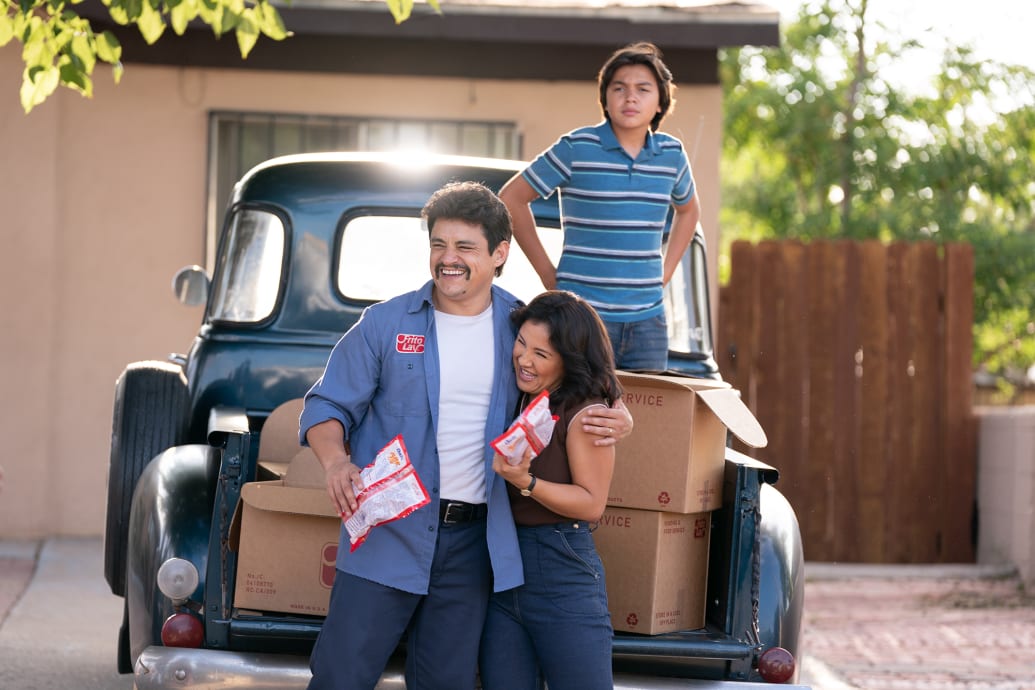When asked if she remembers the first time she ate Flamin’ Hot Cheeto, screenwriter Linda Yvette Chávez answered that her last movie, Eva Longoria, was directed. Fiery Fire, Debuting on Disney+ and Hulu on June 9 — a smile broke out and she made a long, pregnant proposal,”To listen.”
“These are the lifelines of every Mexican kid,” Chávez told The Daily Beast’s Obsessed before the movie was released. “I grew up eating those Cheetos like crazy with chopsticks, trying not to put little pressure on my hands.”
Fiery Fire One of a kind biographical film based on the story of Frito-Lay graduate Richard Montañez about how he (allegedly) invented the Flamin’ Hot Cheeto. Directing several television episodes over the years, Longoria is making a successful debut as a feature director.
Montañez has been telling the Flamin’ Hot Cheetos story for years, and it got a lot of buzz in the mid-2010s. But 2021 Los Angeles times Based on interviews with more than a dozen former employees, the company’s archival records, and Frito-Lay’s own statements, the report revealed that Montañez never invented the Flamin’ Hot Cheeto. Instead, he rose through the corporate ranks and created other snacks instead.
When the movie premieres at Austin’s South by Southwest this March, Longoria is the subject of the movie. Times. “We never set out to tell the history of Cheeto,” he said. “We tell the story of Richard Montañez and we tell his truth.”
Talking to The Daily Beast, Chavez said that 2021’s Times the report broke down just then Fiery Fire was going into production more than two years after they started working on the script. “Ultimately, this isn’t a documentary for me – it’s a powerful film about Richard’s story,” he said, echoing Longoria’s words. The scriptwriter and Longoria united in this understanding.
“Often, as we’ve seen in US history, certain narratives can be deleted or changed, and that’s very easy to do,” Chavez added. “But what I knew I was telling was a story of Richard… his story about his success, his rise, and his family from the bottom up.
When he sat down to talk to Montañez and his wife, Judy, at the start of the project, Chávez felt that “he didn’t need them to prove anything.” “I felt it in my bones when I heard them. I heard my mother, I heard my father, I heard my cousin, I heard myself.” The conversation suggested examples from his own life, such as “things unspoken, manipulated, perhaps underappreciated.”
“It’s hard to describe how complicated it is to be a person of color in this country,” he concluded. “And I know how complicated that is.”
A Chicana director born and raised in Norwalk, California, Chávez creates the kind of characters that instantly draw you in. noble, The Netflix series he co-created with Marvin Lemus in 2020 was a convincing response to Latino trauma porn; serious but ultimately optimistic and filled with intriguing questions about identity, community and gentrification.
Chavez said that when he first met Longoria, they instantly connected. “First of all, it’s hilarious and at the same time it reminds me so much of my family that I walked in and said, ‘Girl, you’re like my daughter. first,said Chávez, referring to his cousin. The screenwriter said Longoria “had a million ideas” beyond that. “Funny, she’s so bright. I always say this: I didn’t feel like I was getting a job with a director for the first time. I felt like I was getting a job with a veteran.”
Annie Gonzalez, who plays Montañez’s wife, Judy Flaming Hot, also starred noble, as the awesome Lidia Solis. He’s been friends with Chavez for ten years. At first, Chávez didn’t think Gonzalez would accept the role; She had always said before that she was tired of playing mother characters. Fortunately, Judy’s character had enough to change Gonzalez’s mind; his strong presence on screen is really fixing. Fiery Fire. (If you want to be successful in this world, Jesse García’s Montañez tells us to “get yourself a Judy”.)
For Chavez, the past he shared with Gonzalez makes his ongoing collaboration even more special. “We always talk about how we mirror each other,” she said. “To be able to rise together in this industry in ways many of our families have never experienced before, it’s incredible, incredible for us.”

While Richard Montañez is the obvious protagonist of his own story, Chávez stressed that his victory was not his only, and it was important to him that both the character and the audience understand this.
“I like to write [for] The men in my community are their voices,” Chavez said. “Most of the time people don’t like the characters in the movie. noble it was men, it was Marvin [writing them]. But most of the time, it was actually me.
Chávez wants the men in her community to open up and give more room to their emotions. In that sense, he said, “I think Richard’s story was for me the story of a man who was very vulnerable, very open, and very willing to ask for help, including his wife and family.” Chávez stated that father-son relationships permeate the film, saying that when Richard asked if he could make a good father figure for his own son, he hoped he was better and more emotionally involved than his own.
“I also had a big goal to grow. matchmaker men cry with the movie,” Chavez said with a grin, “and they cry. … Some guys come to me and say, ‘Dude, do we all have daddy issues?’ I was like, ‘Yeah, you do, so never mind man. Let it go.'”
And if you don’t want to, you can always pretend you got a little spice in your eye.